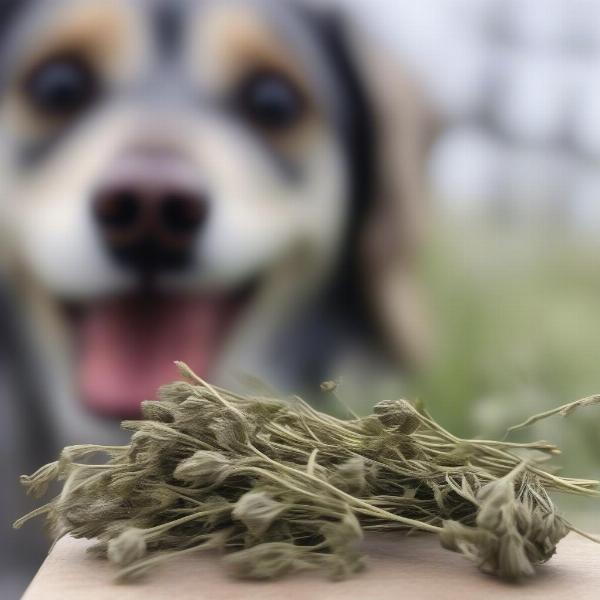Skullcap and valerian root are often touted as natural calming agents for dogs experiencing anxiety or stress. But are they truly effective and safe? This article delves into the potential benefits and risks of using these herbal remedies for your canine companion. We’ll explore the science behind their use, recommended dosages, and important safety considerations to help you make informed decisions about your dog’s well-being.
Understanding Skullcap for Dogs
Skullcap, also known as Scutellaria lateriflora, is a flowering herb traditionally used to alleviate nervous tension and anxiety. While research on its effects on dogs is limited, anecdotal evidence suggests it may help soothe anxious behaviors like excessive barking, pacing, or destructive chewing. It’s thought to work by interacting with GABA receptors in the brain, similar to how some pharmaceutical anti-anxiety medications function. However, it’s crucial to consult with a veterinarian before using skullcap, especially if your dog is on other medications.
 Skullcap for Dogs: Anxiety Relief
Skullcap for Dogs: Anxiety Relief
Valerian Root and its Calming Properties
Valerian root, derived from the Valeriana officinalis plant, is another popular herbal remedy known for its calming and sleep-promoting effects. Similar to skullcap, its mechanism of action is believed to involve GABA receptors, which play a key role in regulating anxiety and sleep. While often used for situational anxiety in dogs, such as during thunderstorms or fireworks, more research is needed to fully understand its efficacy and long-term safety.
Combining Skullcap and Valerian Root for Dogs
Some pet owners choose to combine skullcap and valerian root for a synergistic calming effect. The theory is that their combined action on GABA receptors may enhance their individual benefits. However, it’s important to note that there is no scientific evidence to support this claim, and combining herbs can sometimes lead to unforeseen interactions.
Dosage and Administration for Dogs
Determining the appropriate dosage of skullcap and valerian root for dogs can be tricky, as it depends on factors like the dog’s size, age, and overall health. It’s always best to consult with a holistic veterinarian or a veterinary herbalist who can provide tailored guidance. They can recommend the appropriate form (tincture, capsule, or dried herb) and dosage for your individual dog. Never exceed the recommended dosage, and always start with a low dose to monitor for any adverse reactions.
Safety Considerations and Potential Side Effects
While generally considered safe, both skullcap and valerian root can have potential side effects in dogs. These can include drowsiness, lethargy, upset stomach, or, in rare cases, allergic reactions. It’s crucial to monitor your dog closely after administering these herbs and discontinue use if any adverse reactions occur.
Are Skullcap and Valerian Root Right for Your Dog?
Deciding whether to use skullcap and valerian root for your dog requires careful consideration. While they may offer some benefits for anxiety and stress, more research is needed to confirm their efficacy and long-term safety. Always consult with your veterinarian before giving your dog any herbal remedies, especially if they are on other medications or have underlying health conditions. They can help you assess the potential risks and benefits and determine if these herbs are a suitable option for your dog’s individual needs.
FAQ:
- Can I give my dog skullcap and valerian root every day? Consult your vet for guidance on long-term use.
- What are the signs of an allergic reaction to skullcap or valerian root in dogs? Watch for hives, swelling, difficulty breathing, or vomiting.
- How long does it take for skullcap and valerian root to work in dogs? Effects may vary, but some owners report seeing changes within a few hours.
- Can I use skullcap and valerian root to treat severe anxiety in my dog? For serious anxiety, consult your vet for a comprehensive treatment plan, which may include behavioral therapy and/or medication.
- Are there any drug interactions I should be aware of when using skullcap or valerian root for my dog? Yes, always inform your vet about any other medications your dog is taking to avoid potential interactions.
- Can I grow skullcap and valerian root in my garden for my dog? Yes, but ensure proper identification and preparation to avoid toxicity.
- Where can I purchase high-quality skullcap and valerian root for my dog? Consult your veterinarian for reputable sources.
Related Articles:
herbal treatment for anxiety in dogs
ILM Dog is a leading online resource dedicated to providing dog owners with expert advice and information on all aspects of canine care, from breed selection and health to training and nutrition. We are committed to promoting responsible dog ownership and helping you build a strong, loving bond with your furry friend. Whether you are a seasoned dog owner or just starting your journey, ILM Dog is your trusted companion for all things dog-related. We offer valuable insights into various aspects of dog care, including breed selection, health management, training techniques, and nutritional guidance. For expert advice tailored to your dog’s specific needs, contact us via email at [email protected] or call us at +44 20-3965-8624.